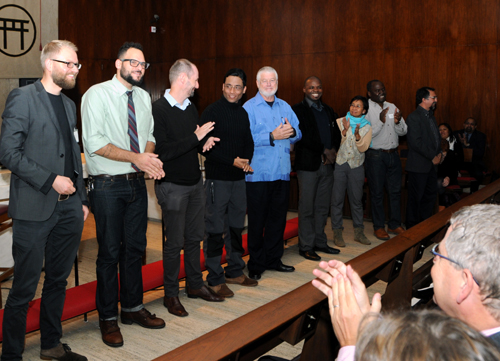Church should speak prophetically on markets, says Yale professor

Christian leaders from four continents and from mainly evangelical backgrounds have met for a Micah Summit at the United Nations in New York to discuss poverty injustice
The Millennium Development Goals, which seek to reduce poverty, were adopted at the same venue in 2000, the World Evangelical Alliance said in a statement on December 11.
Participants from the Micah Challenge campaign (formed by the WEA and Micah Network as a response to the 8 MDGs) grappled with being a prophetic voice to tackle poverty injustice and having a thoughtful and balanced approach to advocacy.
Micah Challenge leaders from around the world during 'Celebration & Sorrow' at the United Nations Church Center in New York.
Theologian Ron Sider said Christians have for too long taken the "ready, shoot, aim" approach to social issues. Instead they should take more careful aim at systemic change by careful research and fact finding, so that "shots" are effective.
The Micah Summit marked the end of 10 years of global campaigning by 25 national campaigns and a transition to a new Micah structure to address the U.N.'s post-2015 development goals.
Professor Miroslav Volf, a theologian from Yale University said the Church must speak prophetically into market economics.
"The well lived life needs to embrace contentment beyond the inherent greed of owning more", he asserted, "and that means conversations about God and transcendence."
ECONOMIC ISSUES
Ron Sider, who has written about social and economic issues for 30 years urged that "we need to be troublemakers to the system. (...) The Church needs to be intelligent and strategic."
WEA said the Summit included lively discussion about what that means for local churches in situations of violence, religious persecution, or corruption.
Speakers from nations with troubled histories including Sri Lanka, Nigeria and Nepal all stressed that doing justice must complement acts of mercy for effective long-term transformation.
The gathering culminated in a 'Celebration and Sorrow' service stressing the achievements and shortcomings of the last 10 years of campaigning by churches around the Millennium Development Goals.
There has been dramatic increase in primary school access for millions, and absolute poverty levels halved and child mortality have both been cut in half.
However, maternal mortality remains stubbornly high, the quality of education and health care globally is patchy and a billion still lack basic sanitation.
The Summit service ended with Mercy Hilderbrand from Canada, born at the beginning of the millennium. Now 14, she pleaded for adults to be "utterly relentless" in their determination to see the MDGs fulfilled.
"You must refuse to give up. You must leave the Micah Summit with an urgent calling to be the generation that ends extreme poverty once and for all."
Micah Challenge, an initiative of the World Evangelical Alliance and Micah Network, is a global movement active in over 40 countries whose aim is to encourage Christians to be committed to the poor, and hold governments accountable to the MDGs.